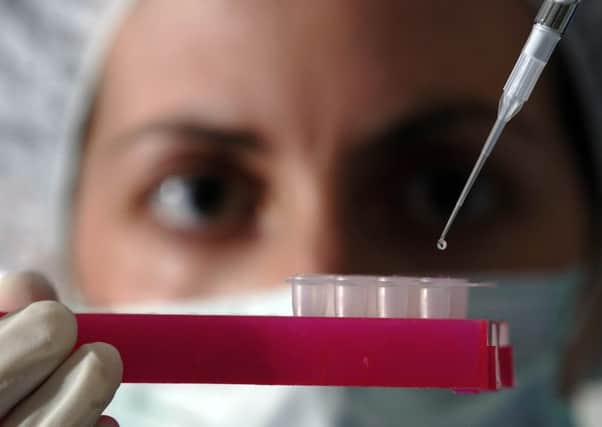Breakthrough genetic test for child cancer patients


Scientists have hailed the move as an “exciting” step towards offering personalised treatment for youngsters with cancer.
The initiative is the first stage of a wider programme which aims to provide testing for all children with solid tumours in the UK and to direct them into clinical trials targeting particular mutations within their tumours, the Institute of Cancer Research (ICR) said.
Advertisement
Hide AdAdvertisement
Hide AdPatients at the Royal Aberdeen Children’s Hospital, Edinburgh’s Sick Kids Hospital and Royal Hospital for Sick Children in Glasgow will be among the 400 children being treated at 21 hospitals across the UK who will receive the test, which identifies key mutations in tumours.
Samples will be sent to to Royal Marsden Hospital, in London, but there are plans to deliver the test directly from Scottish hospitals in future.
Karen Capel, founder and trustee of UK children’s cancer charity Christopher’s Smile - which funded the development of the test, added: “There is an urgent unmet need to provide new treatments for those children diagnosed with the most aggressive and hard-to-treat cancers.
“We believe this gene sequencing test is the key foundation stone in enabling personalised medicine for children. It will help to bring new treatments for children a step closer.
“We believe that children should be given access to the same tests and treatments currently available to adults.
“When our son died in 2008 there was no biological information available to clinicians about individual children’s tumours. This test is a first for children.
“Our aim is that it will change the landscape for children and open doors to potential new trials with new treatments, benefiting those children who receive the worst prognosis.”
Study leader Louis Chesler, professor of paediatric cancer biology at The Institute of Cancer Research, London, and consultant at The Royal Marsden NHS Foundation Trust, said: “Children deserve the very best modern treatments for cancer, but for too long there have been delays in applying the latest molecular techniques to personalise their treatment.
Advertisement
Hide AdAdvertisement
Hide Ad“A more comprehensive and structured approach to genetic testing to match children with cancer to specific targeted treatments could be an incredibly important step towards increasing survival.
“It’s exciting to be testing out this new approach to genetic testing in several hundred children with cancer, in what I hope will be a staging post towards routine use of genomic information for the care of all children with cancer in the UK.
“We still face major barriers in obtaining targeted cancer drugs for children and using them in robustly designed clinical trials.
“But my hope is that through this and other initiatives like it, we can help to drive forward the use of targeted drugs in children, and make the case very clearly that they should be more widely available, as they have been for adults.”
The test, which was developed by scientist at The Institute of Cancer Research, London, and The Royal Marsden NHS Foundation Trust, will initially be open to children under the age of 14 with solid tumours.
It works by sequencing 81 different cancer genes.
The Institute of Cancer Research said scientists will initially aim to assess the usefulness of the test in a research setting.
Once proved successful, it is hoped that test results could be used in clinics, helping doctors make decisions about how patients can be most effectively treated.
It added that targeted drugs can be highly effective at tackling cancer but many of these personalised medicines are not yet routinely available for children.
This is partly because of difficulties in setting up clinical trials, the ICR said.